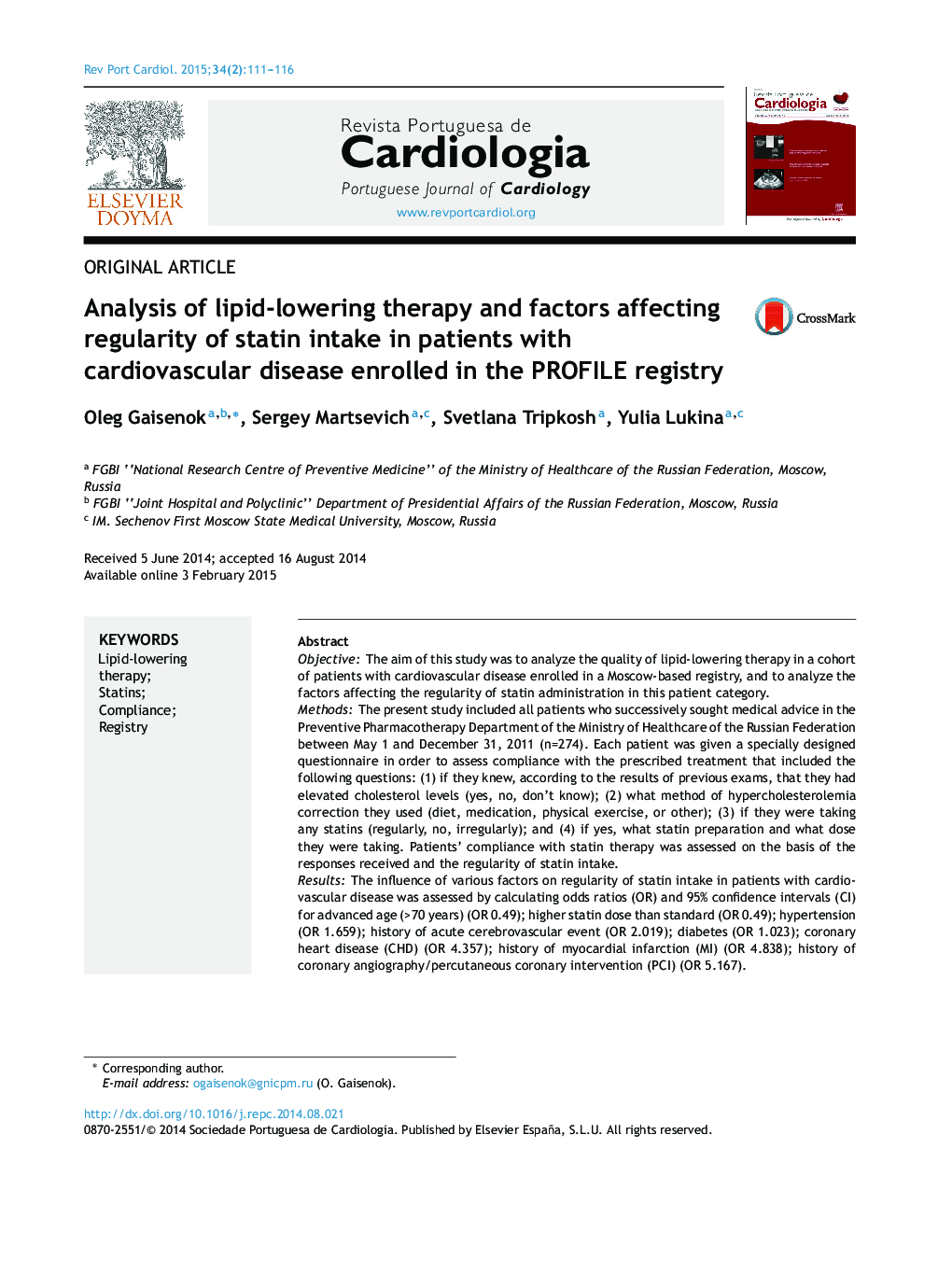| Article ID | Journal | Published Year | Pages | File Type |
|---|---|---|---|---|
| 1125913 | Revista Portuguesa de Cardiologia | 2015 | 6 Pages |
ObjectiveThe aim of this study was to analyze the quality of lipid-lowering therapy in a cohort of patients with cardiovascular disease enrolled in a Moscow-based registry, and to analyze the factors affecting the regularity of statin administration in this patient category.MethodsThe present study included all patients who successively sought medical advice in the Preventive Pharmacotherapy Department of the Ministry of Healthcare of the Russian Federation between May 1 and December 31, 2011 (n=274). Each patient was given a specially designed questionnaire in order to assess compliance with the prescribed treatment that included the following questions: (1) if they knew, according to the results of previous exams, that they had elevated cholesterol levels (yes, no, don’t know); (2) what method of hypercholesterolemia correction they used (diet, medication, physical exercise, or other); (3) if they were taking any statins (regularly, no, irregularly); and (4) if yes, what statin preparation and what dose they were taking. Patients’ compliance with statin therapy was assessed on the basis of the responses received and the regularity of statin intake.ResultsThe influence of various factors on regularity of statin intake in patients with cardiovascular disease was assessed by calculating odds ratios (OR) and 95% confidence intervals (CI) for advanced age (>70 years) (OR 0.49); higher statin dose than standard (OR 0.49); hypertension (OR 1.659); history of acute cerebrovascular event (OR 2.019); diabetes (OR 1.023); coronary heart disease (CHD) (OR 4.357); history of myocardial infarction (MI) (OR 4.838); history of coronary angiography/percutaneous coronary intervention (PCI) (OR 5.167).ConclusionsAnalysis of factors with impact on regular compliance with statin therapy showed that the following were most significant: CHD, history of MI, and history of PCI. Previous cerebrovascular events and presence of diabetes did not motivate these patients to take statins on a regular basis.
ResumoObjetivoO objetivo deste estudo foi analisar a qualidade do tratamento hipolipemiante realizado numa coorte de pacientes portadores de doenças cardiovasculares, obtido sob a forma de registo, em Moscovo, e analisar os fatores que afetam a regularidade da administração de estatinas nesta categoria de pacientes.MétodosO presente estudo incluiu todos os pacientes que consecutivamente procuraram aconselhamento médico no Departamento de Farmacoterapia Preventiva durante o período de 1 de maio a 31 de dezembro 2011 (n=274). Cada paciente recebeu um questionário especialmente concebido para avaliar a adesão dos pacientes ao tratamento realizado, que incluiu as seguintes questões: 1) se tem conhecimento de níveis elevados de colesterol, de acordo com os exames realizados previamente (sim, não, desconhece); 2) que método utiliza para correção da hipercolesterolemia (dieta, medicação, exercício físico, outro); 3) se toma estatinas (toma regularmente, não toma, toma irregularmente); 4) se sim, qual a estatina e a dose. Com base nas resposta recebidas e regularidade da toma de estatinas, foi efetuada a avaliação do conceito de adesão à terapêutica com estes fármacos.ResultadosPara determinar o significado de uma série de fatores de acordo com a sua influência sobre a regularidade da ingestão de estatinas em pacientes com doenças cardiovasculares, foram calculados odds ratio (OR): idade avançada (>70anos) - OR de 0,49; aumento da dose de estatina – OR de 0,49; hipertensão arterial (HA) - OR de 1,65; história prévia de doença cerebrovascular aguda (ACVD)- OR de 2,01; diabetes mellitus (DM)- OR de 1,02; doença arterial coronária (DAC)- OR de 4,35; história prévia de enfarte do miocárdio (IM) – OR de 4,83; antecedenetes de angiografia coronária (CAG)/intervenção coronária percutânea (ICP) OR de 5,16.ConclusõesA análise dos fatores com maior impacto sobre a adesão à toma regular de estatinas mostrou serem mais significativos os seguintes: CHD, história prévia de MI e de PCI. Concomitantemente, salienta-se que a história prévia de ACVD e a presença de DM não motivaram estas classes de doentes a tomar estatinas de forma regular.
